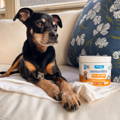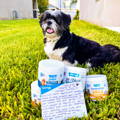Human Foods Dogs Can't Eat: Toxic Food for Dogs
Vet Verified
OCT. 2023 | WRITTEN BY DR. HILLARY WOLFE
Jump to Section

Welcome, fellow dog lovers, to a list we should all have memorized: toxic foods dogs can't eat. We're diving into the nitty-gritty of what foods are bad for dogs and shining a spotlight on the forbidden treats that might be lurking in your pantry. From the surprising culprits to the well-known no-nos, we've got the lowdown on toxic foods for dogs.
So what can't dogs eat, and why? Get ready to take notes, or bookmark this page to reference later. Let’s dive in!
Can dogs eat any human food?
No, dogs can’t eat just any human food, even if it’s just a taste here and there. In fact, we recommend storing toxic foods high out of reach of your pet, especially if you have a mischievous pooch who likes to sneak food off the table or root through the trash.
While some human foods are OK for dogs, what foods can dogs not eat? See below for a list of the top 20 foods dogs can’t eat from your kitchen.
Human foods dogs can't eat
Which ‘people’ foods are bad for dogs? Keep the following foods stored out of reach, invest in a trash can with a lid… Do whatever it takes to prevent your pet from getting their paws on these foods!
Alcohol
Sure, this one is a no-brainer–no loving pet parent would knowingly feed their pet alcohol–but accidental ingestion isn’t out of the question. Many forms of alcohol are found in beverages and foods, which should always be kept out of reach of your pet. Even small amounts of alcohol can cause health issues like vomiting, low body temperature, respiratory depression, and lethargy.
CHOCOLATE
When asking “what can dogs not eat?” chocolate is the most well-known answer. Giving dogs chocolate is always a no-no, even if you don’t think they’re ingesting a lethal amount. Theobromine, the main compound in cocoa beans, is toxic to dogs––as is naturally occurring caffeine in chocolate. Ingestion of chocolate can result in rapid heart rate, vomiting, diarrhea, and even seizures or death.
AVOCADO
The fat content in avocados can be too high for our canine companions’ bodies to handle. Eating too much avocado can lead to gastrointestinal upset like vomiting and diarrhea, and potentially life-threatening conditions like pancreatitis.
food or drinks with caffeine
While caffeine can be a pleasant pick-me-up for humans, it's a big no-no for our canine companions. Humans can metabolize and eliminate caffeine relatively efficiently, however dogs are much less capable of doing so. Consumption of caffeine can overstimulate the cardiovascular and nervous systems, resulting in increased heart rate and blood pressure, restlessness, and even severe signs of toxicity such as seizures.
apple, apricot, & cherry seeds/ pits
Stone fruits like apples, cherries, and apricots may seem like delightful summer treats, but for our canine pals, they're on the list of food dogs can’t eat. Seeds and pits in these fruits contain cyanide compounds that are toxic to dogs. Cyanide ingestion can interfere with the body’s ability to transport oxygen. Even a small nibble can lead to digestive distress, trouble breathing, and in severe cases can be life-threatening. So, while we savor these juicy gems, let's make sure our furry friends stay safe by keeping them out of their reach.

onions, garlic, & chives
Garlic, onions, and chives are vegetables in the allium family. These foods may add flavor to our dishes, but they should never be given to your dog. Allium species contain thiosulfate, a compound that can cause damage to their red blood cells known as hemolytic anemia. Anemic dogs may exhibit symptoms such as weakness, lethargy, and pale gums. In severe cases, hemolytic anemia can result in death.
grapes & raisins
Grapes and raisins, tempting as they may be, are a big no-no for our furry friends. These seemingly harmless snacks can lead to severe kidney damage in dogs. Even a small amount can spell trouble due to a dangerous compound called tartaric acid. This substance found in grape and raisin skins and seeds can lead to renal (kidney) failure that may be life threatening to your pet.
mushrooms
Mushrooms, despite their earthy allure, are on the list of what can't dogs eat. Some wild mushrooms contain toxins that can spell trouble for our furry pals. Ingesting these can lead to a range of issues, from gastrointestinal upset to organ failure. To keep your canine companion safe, steer clear of sharing your mushrooms and opt for dog-friendly treats instead.
xylitol
Xylitol is a sweetener commonly found in peanut butter and sugar-free foods like gum, but it’s important to know the dangers it can cause for our four-legged friends. Even small amounts can trigger a rapid release of insulin in dogs, leading to low blood sugar and potentially life-threatening complications. This ingredient may also be listed as birch sugar, so be sure to read all ingredient lists thoroughly before giving any packaged foods to your dog.
macadamia nuts
While certain nuts are fine for dogs to eat in small servings, macadamia nuts can lead to weakness, tremors, and hyperthermia (overheating) in dogs. The symptoms of macadamia nut toxicity are typically not fatal and usually resolve within 24-48 hours. However, you should still keep this food away from your dog and be sure to contact a veterinarian if you suspect that your dog has ingested macadamia nuts.
milk
Our bodies make an enzyme that helps us digest the lactose found in cow’s milk, but canines don’t have this enzyme. Therefore if you let your dog drink milk–or give them foods made with fresh milk–they can experience major digestive upset. Milk can also be high in calories, which may contribute to weight gain and obesity over time.
nutmeg & eggnog
Nutmeg adds a warm note to our baked goods in fall and winter, but it's a big NO for our four-legged friends! This spice is on the list of what can't dogs eat because ingesting even a small amount can lead to symptoms like vomiting, diarrhea, tremors, seizures, and rapid heart rate in dogs.
CINNAMON
Cinnamon is another spice on the “what can't dogs eat” list. While a sprinkle of this spice may enhance our dishes, it can cause digestive distress and oral irritation. If ingested in large quantities, cinnamon may also result in liver damage due to the presence of coumarin (a compound found in cinnamon and other plants).

salty foods or snacks
Though we may enjoy salting up our dishes for added flavor, salty foods can unfortunately be a health hazard for our furry companions. They're high on the list of what can't dogs eat because excessive salt can lead to sodium ion poisoning, causing symptoms like vomiting, diarrhea, and even seizures.
soda
Soda, a fizzy delight for us, is on the list of what foods are bad for dogs. The high sugar and caffeine content in sodas can lead to upset stomach, obesity, and even caffeine toxicity in our furry friends. So, when it comes to sharing beverages, stick to water for your canine companion's well-being.
energy drinks
Energy drinks for dogs? Never! While no pet parent would ever intentionally give their dog this beverage, accidents happen. Keep energy drinks out of reach to avoid serious risks like gastrointestinal distress or a caffeine overdose.
meat fats
Meat is a good source of protein for dogs, but excess fat is too rich for their digestive tract. Ingesting too much fat can lead to a serious health issue called pancreatitis. Pancreatitis (inflammation of the pancreas) can be life-threatening if left untreated. High fat foods in general–like the avocados we mentioned above–should be restricted in your dog’s diet for this very reason.
peaches
Everyone loves a juicy peach––but don’t give a whole peach to your pup! Just like cherries and apricots, peaches have pits that contain cyanide. Cyanide is severely toxic for your pet, so if you want to share a peach with your pooch, slice off a small amount of flesh to share.
plums
Three guess what we’re going to say about plum pits––you guessed it, toxic! Cyanide is present in plums and most fruits with pits, so don’t let your pets near these fruits without slicing and removing the pits first.
Yeast dough
The last item on our list of foods dogs can’t eat might seem like a curveball, but yeasted dough can be dangerous if your pup sneaks a bite off the counter before baking! As it ferments, yeast produces ethanol and carbon dioxide that can lead to serious side effects similar to alcohol poisoning. Bloating, disorientation, and gastric dilatation and volvulus (GDV) can be dangerous and, in severe cases, fatal.
Why can't dogs eat the same foods as humans?
Biological and physiological variations make all the difference when it comes to why canines can’t have the same foods as humans. Whether it’s a certain enzyme dogs lack to digest a certain food or a sensitivity to an ingredient, the laws of nature have made it clear that our pets aren’t meant to eat the same foods as humans. It’s our responsibility as pet parents to give them the foods they need, while keeping them away from the foods they don’t!
The list of what dogs can’t eat might seem long, but there are still plenty of “people” foods that your dog can enjoy in moderation. Whole foods like chicken, brown rice, blueberries, and carrots are safe for most dogs, but don’t introduce people food into your dog’s diet without talking to your veterinarian first. They’ll know which foods can benefit their diet, and which ones should be avoided for your unique dog.
Join the Pack!

Sign up for exclusive deals, curated pet tips from veterinarians, and product launches!
Pet Parents are Also Reading
August, 2023
October, 2022
September, 2023
June, 2023
Written By a Vetnique Vet

Dr. Hillary Wolfe, DVM, CVFT
Dr. Wolfe is a traveling veterinarian and the owner of Tula Veterinary Nutrition. She is passionate about enhancing pet health and longevity through food, with a strong focus on natural nutrition and homemade diets.
Sign up for exclusive deals, curated pet tips from veterinarians, and product launches!
























